How to Choose the Perfect Gantry Crane Supplier?
How to Choose the Perfect Gantry Crane Supplier
In industrial operations, choosing the right gantry crane supplier is paramount to success. These heavy-duty machines are essential for lifting and moving heavy loads efficiently and safely. However, with numerous suppliers in the market, finding the perfect fit can be overwhelming. In this guide, we'll navigate through the key considerations to help you make an informed decision.
The choice of gantry crane supplier can significantly impact your business operations. A reliable supplier not only provides high-quality equipment but also offers excellent support and service throughout the crane's lifespan. On the flip side, partnering with the wrong supplier can lead to operational disruptions, costly repairs, and safety hazards.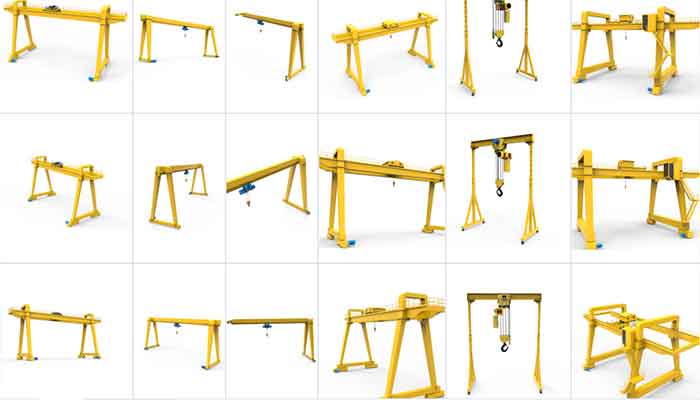
All types of gantry crane for sale, portable gantry cranes and single girder and double girder goliaty gantry cranes
Overview of Key Considerations
Before diving into the selection process, it's crucial to understand your specific requirements. Consider factors such as the type of loads you'll be lifting, the frequency of use, and the working environment. Additionally, establish a budget to guide your decision-making process.
- Researching potential suppliers is the next step. Utilize online resources, industry recommendations, and attend trade shows to gather information. Look for suppliers with a solid reputation, extensive experience, and positive customer feedback.
- Once you've compiled a list of potential suppliers, evaluate their credentials carefully. Verify their certifications, compliance with industry standards, and check their track record with previous installations. Quality should be a top priority when assessing suppliers.
- Technical specifications play a crucial role in determining the suitability of a supplier. Consider factors such as crane design, material quality, and customization options. A reputable supplier will offer flexibility in meeting your specific requirements and provide expert advice on crane selection.
- When comparing pricing, it's essential to look beyond the initial cost. Consider the total cost of ownership, including maintenance, repairs, and downtime. Look for suppliers who offer competitive pricing without compromising on quality or service.
- Communication is key throughout the selection process. Evaluate suppliers' responsiveness and willingness to address your concerns. Clear and open communication is essential for building a successful partnership.
- Finally, make your decision based on a combination of factors, including reputation, quality, pricing, and communication. Once you've chosen a supplier, finalize the contract details and establish a plan for post-purchase support and maintenance.
In conclusion, selecting the right gantry crane supplier requires careful consideration of various factors. By following these guidelines and conducting thorough research, you can ensure a successful partnership that meets your lifting needs for years to come.
Assessing Your Requirements
Before diving into the process of selecting a gantry crane supplier, it's essential to have a clear understanding of your specific requirements. Assessing your needs lays the foundation for finding the perfect crane solution that aligns with your operational goals and budget constraints.
Begin by identifying the primary purpose of the gantry crane within your operations. Are you lifting materials in a manufacturing facility, loading and unloading cargo in a warehouse, or performing construction tasks on a job site? Each application comes with its unique set of requirements, such as lifting height, span, and mobility.
Consider factors such as the type and size of loads you'll be lifting, the frequency of lifts, and the working environment. For example, if you're lifting heavy machinery in a confined space, you may require a compact gantry crane with precise maneuverability. Understanding these application-specific needs will help narrow down your options and ensure you choose a crane that meets your operational demands.
Determining Load Capacity and Crane Specifications
Once you've identified your application needs, the next step is to determine the load capacity and crane specifications required to handle your lifting tasks safely and efficiently. Assess the heaviest loads you'll be lifting and consider any potential future growth in load size or weight.
Factors such as span length, lifting height, and operating environment will influence the crane specifications. For instance, if you're working in a corrosive or hazardous environment, you may need a gantry crane with specialized coatings or explosion-proof features for safety and longevity.
Additionally, consider the speed and precision required for your lifting operations. Will you be performing repetitive lifts with high accuracy, or do you need a crane that offers variable speed control for precise positioning? Understanding these specifications will help ensure that the gantry crane you choose is optimized for your specific workflow and operational requirements.
Identifying Budget Constraints
Budget constraints play a significant role in the selection process and should be carefully considered from the outset. Determine a realistic budget based on your financial resources and operational needs. Keep in mind that while upfront costs are important, the total cost of ownership over the crane's lifespan should also be factored in.
Consider not only the initial purchase price of the gantry crane but also ongoing maintenance, repairs, and operational costs. Investing in a high-quality crane from a reputable supplier may require a higher upfront investment but can result in long-term cost savings through reduced downtime and maintenance expenses.
Evaluate your budget constraints in conjunction with your application needs and desired crane specifications to find the best balance between cost and performance. By understanding your requirements and budget constraints upfront, you can streamline the selection process and choose a gantry crane solution that delivers optimal value and return on investment for your business.
Researching Potential Suppliers
Once you have a clear understanding of your requirements and budget constraints, the next step is to research potential gantry crane suppliers. Thorough research is essential to ensure that you partner with a reputable supplier who can meet your needs and provide reliable support throughout the crane's lifecycle.
Online Search and Reviews
Start your search by conducting an online search for gantry crane suppliers. Utilize search engines, industry directories, and online marketplaces to identify potential suppliers in your area or those that specialize in your industry. Visit their websites to learn more about their products, services, and company history.
Pay attention to customer reviews and testimonials to gauge the reputation of each supplier. Look for reviews from customers who have similar operational needs and applications to yours. Positive reviews and high ratings are indicators of a supplier's reliability and customer satisfaction.
Additionally, explore online forums and industry-specific websites where professionals share their experiences and recommendations for gantry crane suppliers. Engaging with online communities can provide valuable insights and recommendations that may not be readily available through other channels.
Industry Recommendations and References
Seek recommendations and references from colleagues, industry peers, and other businesses within your network. Reach out to companies that have experience with gantry crane installations and inquire about their supplier experiences. Ask specific questions about the quality of the equipment, level of customer service, and overall satisfaction with the supplier.
Industry associations and trade organizations can also be valuable resources for finding reputable gantry crane suppliers. Attend networking events, seminars, and conferences to connect with industry professionals and gather recommendations. Building relationships within your industry network can provide access to trusted suppliers and valuable insights into the market landscape.
Attend Trade Shows and Exhibitions
Trade shows and exhibitions are excellent opportunities to meet gantry crane suppliers face-to-face and see their products in action. Attend industry-specific events and exhibitions where gantry crane suppliers showcase their latest innovations and technologies.
Take advantage of the opportunity to speak directly with representatives from different suppliers, ask questions, and gather information about their products and services. Request demonstrations or product presentations to get a firsthand look at the features and capabilities of each crane model.
Networking with other attendees and industry experts at trade shows can also provide valuable recommendations and insights into the strengths and weaknesses of various suppliers. Take notes, collect brochures and business cards, and follow up with suppliers after the event to continue the conversation and gather additional information.
By conducting thorough research through online searches, industry recommendations, and attending trade shows, you can gather valuable insights and information to help you make an informed decision when selecting a gantry crane supplier. Take the time to evaluate each potential supplier carefully and choose a partner who can meet your needs and provide reliable support for your crane operations.
Evaluating Supplier Credentials
Once you've identified potential gantry crane suppliers, it's essential to thoroughly evaluate their credentials to ensure they are qualified and reputable. Assessing key factors such as company experience, certifications, and client testimonials can help you make an informed decision and choose a supplier you can trust.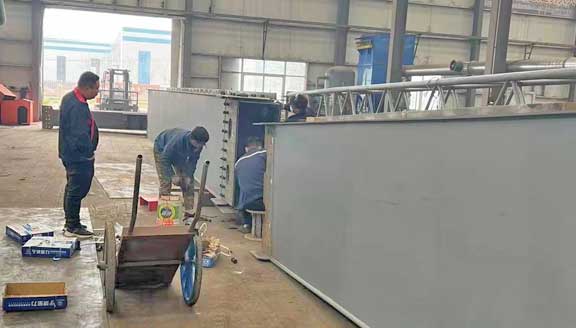
30 ton gantry crane processing at Yuantai Crane factory 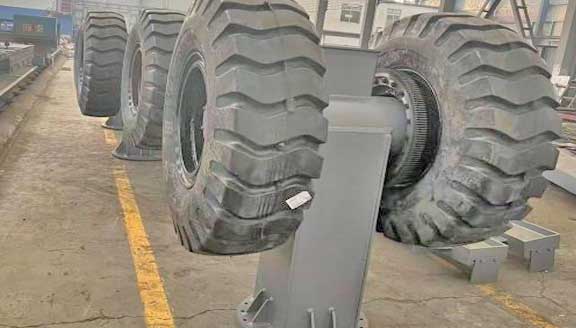 Rubber tyred wheels of 30 ton gantry crane processing at Yuantai Crane factory
Rubber tyred wheels of 30 ton gantry crane processing at Yuantai Crane factory 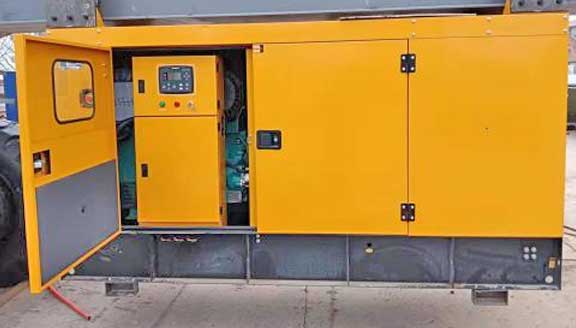 Electrical cabinet of 30 ton gantry crane processing at Yuantai Crane factory
Electrical cabinet of 30 ton gantry crane processing at Yuantai Crane factory 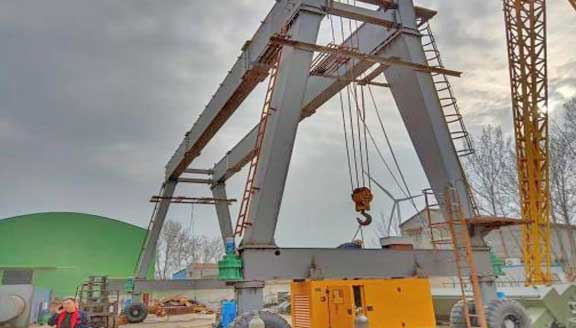 Gantry crane testing before painting and delivery
Gantry crane testing before painting and delivery
Company Experience and Reputation
Start by researching each supplier's experience and reputation in the industry. Look for suppliers with a proven track record of success and longevity in the market. Consider factors such as the number of years the company has been in business, the size and scale of their operations, and their reputation within the industry.
Check for any awards, recognitions, or industry affiliations that demonstrate the supplier's commitment to excellence and quality. Additionally, seek out customer reviews and testimonials to gauge the satisfaction levels of past and current clients. Positive feedback from satisfied customers is a strong indicator of a supplier's reliability and credibility.
Certifications and Compliance with Standards
Verify that each supplier holds the necessary certifications and complies with industry standards and regulations. Look for certifications such as ISO 9001 for quality management systems and ISO 14001 for environmental management systems. These certifications indicate that the supplier adheres to stringent quality and environmental standards in their operations.
Ensure that the gantry cranes offered by the supplier meet all relevant safety and performance standards set forth by regulatory bodies such as OSHA (Occupational Safety and Health Administration) or ANSI (American National Standards Institute). Compliance with these standards is essential to ensure the safety and reliability of the equipment in your workplace.
Quality of Previous Installations and Client Testimonials
Request information about previous gantry crane installations completed by each supplier and evaluate the quality of their workmanship. Ask for case studies or examples of projects similar to yours to assess the supplier's expertise and capabilities. Inspect the quality of materials used, attention to detail, and overall craftsmanship of the installations.
Client testimonials and references are invaluable sources of insight into the supplier's performance and reliability. Reach out to past clients and ask about their experiences working with the supplier. Inquire about the level of customer service, responsiveness to inquiries or concerns, and overall satisfaction with the gantry crane solutions provided.
By thoroughly evaluating each supplier's credentials in terms of company experience, certifications, and client testimonials, you can confidently choose a supplier that meets your requirements and delivers high-quality gantry crane solutions. Investing time in this evaluation process upfront can save you from potential headaches and ensure a successful partnership with a trusted supplier.
Analyzing Technical Specifications
With potential suppliers identified and their credentials evaluated, it's time to dive into the technical specifications of the gantry crane offerings. Analyzing these specifications will help ensure that the chosen supplier can deliver a crane solution that not only meets your operational requirements but also offers the quality and flexibility necessary for long-term success.
Crane Design and Engineering Capabilities
Begin by examining the design and engineering capabilities of each gantry crane supplier. Assess the structural integrity and stability of their crane designs, considering factors such as load capacity, span length, and lifting height. Look for suppliers who utilize advanced engineering techniques and state-of-the-art technologies to optimize crane performance and safety.
Evaluate the efficiency and reliability of the crane's lifting mechanisms, including hoists, trolleys, and controls. Consider whether the supplier offers various lifting configurations, such as single or double girder designs, to accommodate different load types and operational needs. A supplier with comprehensive design and engineering capabilities can tailor the crane solution to your specific requirements, ensuring optimal performance and productivity.
Material and Component Quality
Next, assess the quality of materials and components used in the construction of the gantry crane. Look for suppliers who source high-grade materials and components from reputable manufacturers to ensure durability and longevity. Consider factors such as the type of steel used in the crane's structure, the quality of electrical components, and the reliability of mechanical parts.
Inspect the manufacturing processes employed by the supplier to ensure consistency and precision in the fabrication of crane components. Quality control measures such as weld inspections, material testing, and dimensional accuracy checks are indicators of a supplier's commitment to delivering high-quality products.
Customization Options and Flexibility
Finally, consider the customization options and flexibility offered by each gantry crane supplier. Assess whether the supplier can accommodate specific customization requests to tailor the crane solution to your unique operational requirements. Look for suppliers who offer a range of optional features and accessories, such as variable speed controls, wireless remote operation, and specialized lifting attachments.
Evaluate the supplier's ability to adapt to changes in your operational needs over time. A flexible supplier can provide solutions for future expansion or modification of your crane system, ensuring scalability and versatility. Additionally, consider the supplier's lead times and responsiveness to customization requests to ensure timely delivery and installation of the crane.
By analyzing the technical specifications of gantry crane offerings in terms of design and engineering capabilities, material and component quality, and customization options and flexibility, you can select a supplier that delivers a crane solution tailored to your specific requirements. Investing in a high-quality and flexible crane system ensures optimal performance, reliability, and safety in your operations for years to come.
Comparing Pricing and Value Proposition
As you narrow down your options for gantry crane suppliers, it's essential to compare pricing and value propositions to make an informed decision that aligns with your budget and operational needs. Evaluating the total cost of ownership and considering long-term support and maintenance services will help you choose a supplier that offers the best value for your investment.
Requesting Detailed Quotations
Begin by requesting detailed quotations from each gantry crane supplier on your shortlist. Ensure that the quotations provide a breakdown of costs for the crane system, including equipment, installation, and any optional features or accessories. Clarify whether the quotation includes additional expenses such as shipping, taxes, or site preparation to avoid any surprises later on.
Review each quotation carefully to understand the scope of work and the items included. Compare the pricing structure and payment terms offered by each supplier to determine the most competitive option. Keep in mind that while price is an important factor, it should not be the sole determinant of your decision.
Assessing Total Cost of Ownership
In addition to upfront costs, assess the total cost of ownership (TCO) of the gantry crane over its lifespan. Consider factors such as maintenance, repairs, downtime, and energy consumption when calculating the TCO. A supplier may offer a lower upfront price but higher long-term costs if the crane requires frequent repairs or consumes more energy.
Evaluate the reliability and durability of the crane systems offered by each supplier to estimate maintenance and repair expenses over time. Look for suppliers who use high-quality materials and components and offer comprehensive warranties to minimize the risk of unexpected costs. Additionally, consider the supplier's reputation for customer support and responsiveness to service requests when assessing the TCO.
Considering Long-Term Support and Maintenance Services
Finally, consider the long-term support and maintenance services provided by each gantry crane supplier. Evaluate the supplier's capabilities for providing timely maintenance, repairs, and technical support throughout the crane's lifespan. Look for suppliers who offer preventive maintenance programs and scheduled inspections to ensure the continued reliability and safety of your crane system.
Assess the availability of spare parts and the supplier's response time for service requests to minimize downtime and maximize productivity. Consider the supplier's proximity to your location and their ability to provide on-site support when needed. A supplier that prioritizes customer support and offers comprehensive maintenance services will provide greater value and peace of mind over the life of your gantry crane.
By comparing pricing and value propositions, assessing the total cost of ownership, and considering long-term support and maintenance services, you can choose a gantry crane supplier that offers the best value for your investment. Investing in a reliable and cost-effective crane solution ensures smooth operations and maximum productivity for your business.
Communication and Collaboration
Effective communication and collaboration are essential elements of a successful partnership with a gantry crane supplier. As you finalize your decision, focus on assessing the supplier's responsiveness, clarifying terms and conditions, and negotiating contracts and service agreements to ensure a smooth and mutually beneficial collaboration.
Assessing Responsiveness and Communication Channels
Evaluate the supplier's responsiveness and communication channels throughout the selection process. Pay attention to their timeliness in responding to inquiries, addressing concerns, and providing updates on the status of your project. A supplier who is proactive and communicative demonstrates a commitment to customer satisfaction and can be relied upon to address any issues that may arise promptly.
Assess the effectiveness of the communication channels utilized by the supplier, such as email, phone, or online portals. Determine whether they offer multiple points of contact and access to key personnel who can assist you throughout the procurement and installation process. Clear and open communication lays the foundation for a transparent and collaborative partnership with your gantry crane supplier.
Clarifying Terms and Conditions
Clarify the terms and conditions of the proposed agreement with the gantry crane supplier to ensure mutual understanding and alignment of expectations. Review the contract carefully and seek clarification on any ambiguous or unclear provisions. Pay attention to key terms such as delivery timelines, payment terms, warranties, and dispute resolution procedures.
Discuss any special requirements or considerations specific to your project and ensure that they are accurately reflected in the contract. Clarify the scope of work, including responsibilities for installation, training, and ongoing support services. Open and honest communication during the contract negotiation phase helps prevent misunderstandings and lays the groundwork for a successful collaboration.
Negotiating Contracts and Service Agreements
Negotiate the terms of the contract and service agreements with the gantry crane supplier to achieve a mutually beneficial arrangement. Discuss pricing, payment terms, and any additional services or provisions that may be required. Be prepared to compromise on certain terms while advocating for your priorities and objectives.
Consider engaging legal counsel or procurement specialists to review the contract and ensure that your interests are protected. Seek clarity on warranty coverage, liability limitations, and termination clauses to mitigate risks and safeguard your investment. Negotiating a fair and comprehensive contract sets the stage for a positive and productive relationship with your gantry crane supplier.
By assessing responsiveness and communication channels, clarifying terms and conditions, and negotiating contracts and service agreements, you can establish a solid foundation for collaboration with your gantry crane supplier. Effective communication and transparent agreements foster trust and cooperation, paving the way for successful project execution and long-term partnership.
Final Decision and Follow-Up
As you approach the final stages of selecting a gantry crane supplier, it's crucial to conduct thorough due diligence and finalize key arrangements to ensure a smooth transition and successful implementation of your crane system. This includes conducting supplier site visits, finalizing contractual agreements, and establishing post-purchase support and maintenance plans.
Conducting Supplier Site Visits
Schedule site visits to the facilities of the shortlisted gantry crane suppliers to gain firsthand insight into their operations, capabilities, and quality standards. During the visit, observe the manufacturing processes, quality control measures, and overall organizational culture. Engage with key personnel, including project managers and engineers, to discuss your requirements and expectations.
Evaluate the supplier's production capabilities, inventory management practices, and adherence to safety protocols. Inspect the quality of completed crane systems and installations to ensure they meet your standards and specifications. A site visit provides an opportunity to validate the information provided by the supplier and build confidence in their ability to deliver on their promises.
Finalizing Contractual Agreements
Once you've conducted site visits and completed your evaluation of the gantry crane suppliers, it's time to finalize contractual agreements. Review the terms and conditions of the contract carefully to ensure they accurately reflect the agreed-upon scope of work, pricing, and responsibilities. Seek legal advice if necessary to ensure the contract protects your interests and mitigates risks.
Negotiate any outstanding terms or modifications to the contract based on the insights gained during the site visits and discussions with the supplier. Confirm delivery timelines, payment schedules, and warranty provisions to establish clear expectations for both parties. Once all parties are satisfied with the terms, sign the contract and proceed with the next steps in the procurement process.
Establishing Post-Purchase Support and Maintenance Plans
Following the finalization of contractual agreements, work with the gantry crane supplier to establish post-purchase support and maintenance plans. Discuss service level agreements, response times for technical support, and procedures for warranty claims and repairs. Clarify the process for ordering spare parts and scheduling routine maintenance inspections to ensure the continued reliability and performance of your crane system.
Document the agreed-upon support and maintenance plans in writing and incorporate them into the contractual agreements for reference. Establish clear lines of communication for addressing any issues or concerns that may arise during the crane's operation. Building a strong partnership with the supplier based on trust and transparency is essential for long-term success and satisfaction.
By conducting supplier site visits, finalizing contractual agreements, and establishing post-purchase support and maintenance plans, you can make a well-informed final decision and set the stage for a successful implementation of your gantry crane system. Effective follow-up ensures that both parties are aligned and prepared to fulfill their respective obligations, laying the groundwork for a productive and collaborative partnership.
Conclusion
As you wrap up the process of selecting a gantry crane supplier, it's essential to reflect on the key points discussed throughout the evaluation process. By conducting a thorough assessment and taking the necessary steps to finalize your decision, you can ensure a successful partnership that meets your lifting needs for years to come.
Recap of Key Points
Throughout this guide, we've covered various aspects of selecting a gantry crane supplier, including assessing your requirements, researching potential suppliers, evaluating credentials, analyzing technical specifications, comparing pricing and value proposition, communicating and collaborating effectively, making the final decision, and establishing post-purchase support and maintenance plans.
We emphasized the importance of understanding your application needs, determining load capacity and crane specifications, and identifying budget constraints to guide your decision-making process. We also highlighted the significance of researching potential suppliers, evaluating their credentials, and analyzing technical specifications to ensure that you choose a supplier who can meet your requirements and deliver a high-quality crane solution.
Importance of Thorough Evaluation
Thorough evaluation is crucial when selecting a gantry crane supplier to ensure that you make an informed decision and mitigate risks. By conducting research, assessing credentials, analyzing technical specifications, and comparing pricing and value proposition, you can identify the best supplier for your needs and establish a solid foundation for a successful partnership.
Taking the time to visit supplier facilities, finalize contractual agreements, and establish post-purchase support and maintenance plans demonstrates your commitment to ensuring the reliability and longevity of your crane system. Thorough evaluation minimizes the risk of costly mistakes and maximizes the likelihood of a positive outcome for your lifting operations.
Looking Ahead to Successful Crane Operations
As you finalize your decision and prepare to implement your gantry crane system, it's essential to look ahead to successful crane operations. With the support of your chosen supplier and a well-executed plan in place, you can expect smooth and efficient lifting operations that enhance productivity and safety in your workplace.
Effective communication, collaboration, and ongoing support from your supplier are essential for maximizing the performance and lifespan of your crane system. By maintaining open lines of communication, addressing any issues promptly, and adhering to recommended maintenance practices, you can ensure that your gantry crane operates reliably and efficiently for years to come.
In conclusion, selecting the right gantry crane supplier requires careful consideration and thorough evaluation. By following the guidelines outlined in this guide and leveraging the expertise of your chosen supplier, you can achieve successful crane operations that meet your lifting needs and contribute to the overall success of your business.




